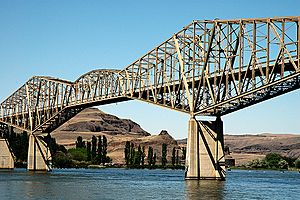Snake River Bridge facts for kids
Quick facts for kids Snake River Bridge |
|
|---|---|
 |
|
| Coordinates | 46°35′22.88″N 118°13′9.89″W / 46.5896889°N 118.2194139°W |
| Carries | |
| Crosses | Snake River |
| Locale | near Starbuck, Washington |
| Maintained by | WSDOT |
| Characteristics | |
| Design | Cantilever bridge |
| Total length | 2,040 ft (618 m) |
| Longest span | 518 ft |
| History | |
| Construction begin | 1926 |
| Construction end | 1927 |
| Opened | 1968 (at current location) |
|
Snake River Bridge
|
|
| MPS | Historic Bridges/Tunnels in Washington State TR |
| NRHP reference No. | 82004207 |
| Added to NRHP | July 16, 1982 |
The Snake River Bridge is also known as the Lyons Ferry Bridge. It crosses the Snake River where it meets the Palouse River. You can find it near Starbuck, Washington, in the USA. This important bridge is part of Washington State Route 261.
In 1982, the bridge was added to the National Register of Historic Places. This means it's recognized as a special historical structure. It sits right next to Lyons Ferry Park, a popular spot for visitors.
Contents
Building the Bridge: A Story of Two Locations
The Snake River Bridge has an interesting history. It was first built in 1927, but not in its current spot!
Where Was the Bridge First Built?
The bridge was originally called the Vantage Ferry Bridge. It was located in Vantage, Washington. There, it helped people cross the Columbia River. Before the bridge, a small ferry carried cars across the river. By 1923, this ferry was very busy, moving about 50,000 people each year. Everyone agreed a bridge was needed.
Why Was a New Bridge Needed?
The state of Washington wanted to build its own bridge. This was because the governor, Louis F. Hart, did not want a toll bridge. A toll bridge would charge people money to cross. Building a toll bridge would also mean the state could lose a lot of money from the government. So, the state decided to pay for its own bridge instead.
Why Did the Bridge Move?
Years later, in the 1960s, a new dam was built on the Columbia River. This dam was called the Wanapum Dam. When the dam was finished, it caused the river to rise and flood the town of Vantage. The old bridge was also getting too small for all the cars. So, officials decided to build a new, bigger bridge in Vantage.
The original Vantage Ferry Bridge was taken apart. Its pieces were carefully stored away.
Finding a New Home for the Bridge
Meanwhile, at Lyons Ferry, people crossed the Snake River using a ferry. But another dam, the Lower Monumental Dam, was built. This made the river flow slower, which meant the ferry trips took much longer. State officials then had a great idea! They decided to rebuild the old Vantage Ferry Bridge at Lyons Ferry. This is how the Snake River Bridge found its new home, where it still stands today.
 | John T. Biggers |
 | Thomas Blackshear |
 | Mark Bradford |
 | Beverly Buchanan |

